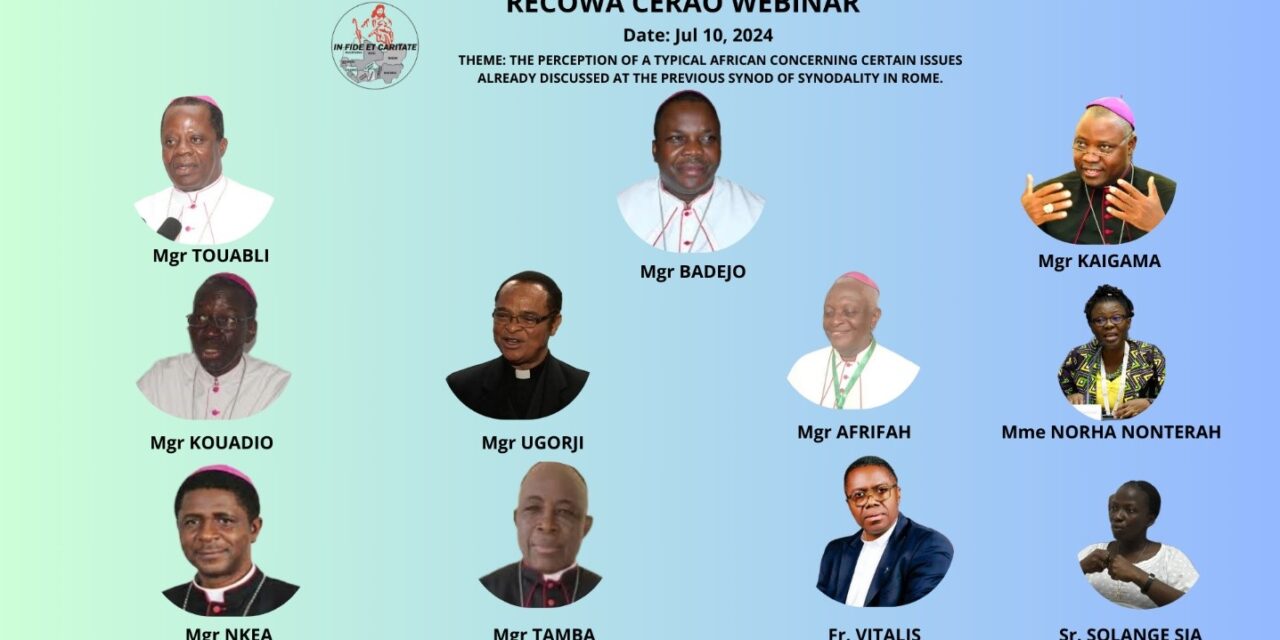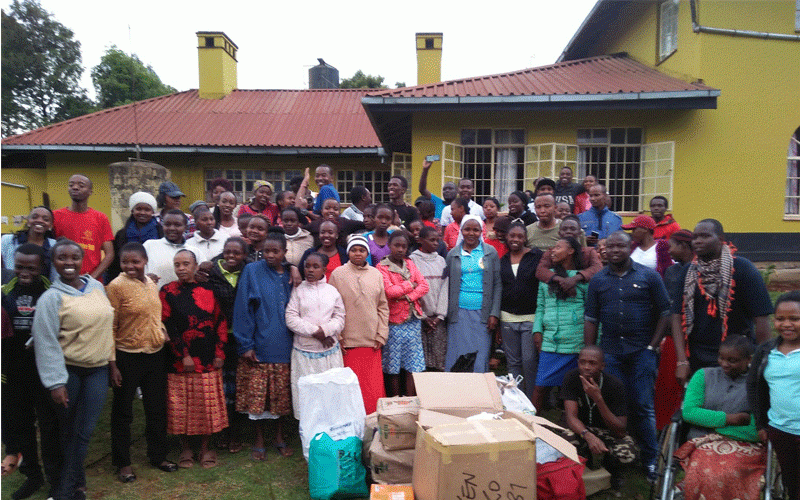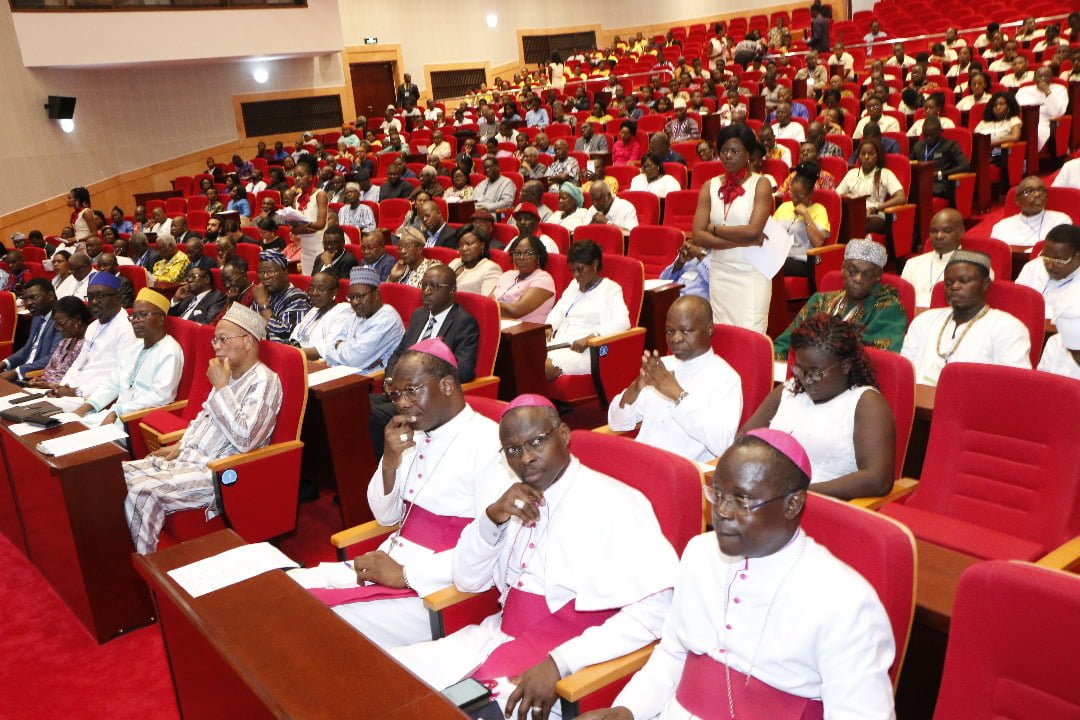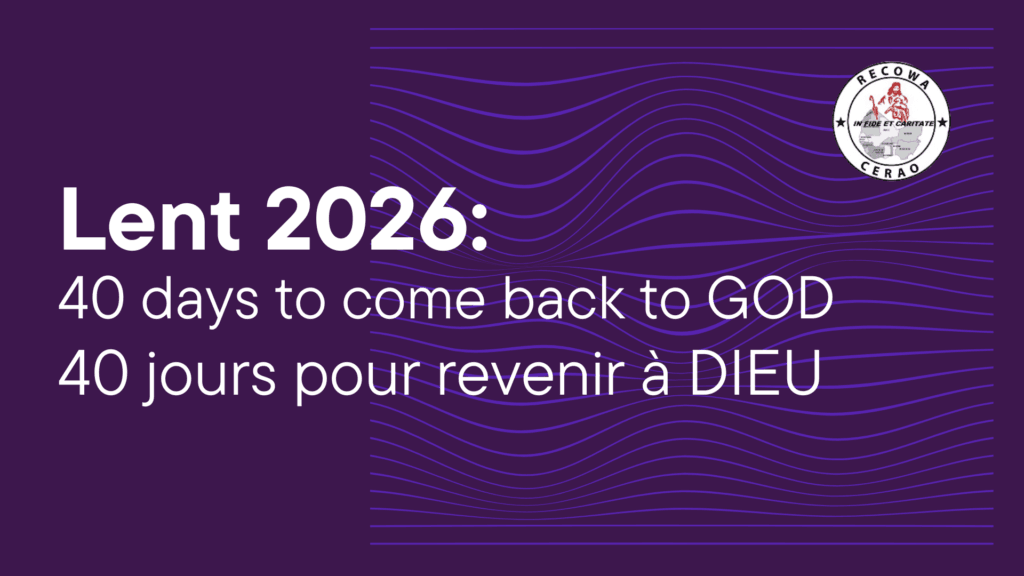The next question bothering on the care of the poor and the marginalized was addressed to Dr. Nora Kofognotera Nonterah, a lecturer at the University of Science and Technology in Kumasi Ghana. She began by thanking the organizers of this Webinar. She also thanked those who spoke before her and continued by saying, “I think I just want to pick a few notes from the last speaker before myself who said we shall have only one master and I start with a story of a young boy who met me and said Doc you talk a lot about synodality and I heard that we are trying to model synodality after the concept of family and the African understanding of family”. The young man continued, “when you were speaking in the Seminary the last time, I heard you refer to one of the bishops as my father or my Lord so if we are saying that we are modeling the Church after the family then I think that we should have one father”. At this point, Nora expressed that she was a bit confused and each time she wanted to call a priest father or a Bishop bad she always remembers that story.
However, that indeed may be true that we shall have only one father if we are following the African understanding of the Church. Even at that, to have one father with this understanding as Bishop rightly said a few minutes ago, we must reflect on the attributes of a family. Therefore, any family that does not have the concept of communion, and consultation does not stand the test. These are the most important ingredients for me making sure that everybody is carried along. If any family is short of these qualities, that family does not qualify to be referred to as a family. To stand and be counted as a good family, therefore, we the Church in Africa should strive to be a synodal Church which would be a church of communion, and consultation and a church that strives every day to carry everybody along and the way words of our late Lauren Maga he says, “Everybody Must count in the Church». This implies that anytime we talk about the family, we are referring to a space where everybody must count.
At this point, she remembered another question posed by a different young person who asked, “Mama Nora why is it that in our Church we I don’t always see the people who do not hear, I don’t always see the people who cannot speak” Of course he was speaking in the local language where there are names for the deaf and dumb and then he was describing it them and he said why don’t I often see them in our Church where are they? Jesus doesn’t speak to them or when Jesus speaks, they don’t hear? She narrated that she smiled and had a very long conversation with the young lad but Dr; Nora pointed out that these are the practical things that a synodal Church like that is family that has to carry everybody along must undertake. Let us not forget that since we started with these conversations on synodality, we have talked a lot about structures and we have talked a lot about certain important groups in the Church and the conversation is up there among Scholars and among Church leaders but the conversation has to come down to the ordinary people because if we want everybody to count, it is not the bishops or the priests only it is every Christian, every baptized Christian and as the documents have been clear on that, we are all called to Mission because the church itself is Mission and it is on Mission. Therefore, taking baptism as a source of ministry, we are all children of God playing different functions here on Earth as Fathers, asMothers bishops priests etc.,
One thing is certain, we are not going to discard the idea of everyone playing his/ her role in the Church because these are functions that would remain the way they are but we all in our various roles that we are playing as children of God from the same family, we have to take care of each other. In her opinion what we need to do practically is that we need to encourage the fact that at the local level, there are structures for various units where listening plays a vital role. We need to build the culture of listening and the culture of listening would go beyond the structures and the units of listening that we talked about which are very important. The implication is that in families, being able to listen to each other is very crucial; children need to be listened to because at times, children are relegated to the background as the poor and they are marginalized in families and these families are domestic Churches
Therefore, when we are talking of synodality we don’t have to think that it is the bishops who are not listening, we don’t have to think that it is the parish priest who is not listening, we have to agree that we all need to build a culture of listening where parents also have to listen to Children and where children also have to listen to parents. It is a culture where the priests have to listen to Bishops and where Bishops have to listen to priests. The point is that all of us have to learn to listen and we cannot leave this to happenstance, it has to come through education and creation of awareness. Nora thinks that the discourse on synodality has to transcend our level, it has to because we have had enough at our level where all our Church leaders have been having this conversation. She noted that it has to leave there and drop to the grounds so that everybody at the Grassroots should be talking about synodality. First of all, trying to understand it through education as Sr. Solange has already mentioned.
We need to do that at the Grassroots level and secondly, we need also to be aware that when we are talking of the marginalized in our societies it is not only those we have mentioned already, those who are differently abled, the children and the youth but also, we have situations like spiritual poverty in the Church spiritual poverty in the Church where many young people do not receive communion and we am not saying that we should have structure that would just allow them to receive communion irrespective of their irregular situations but we are saying that we can be deliberate about having conversations with these people in our local communities.
Nora declared that she sometimes likes to use herself as an example, though that can be very difficult but sometimes you have to do it for the sake of what we are doing. The point is that certain young people are going through some difficulties which are even difficult to voice it out to anybody. In that case, one goes through it alone. We know of many women and many men who are going through divorce or annulment process in the parishes but they have to do this all by themselves. The question comes up, can we get some listening ears that will take care of situations like these? Some cannot get people to accompany them on this Journey not even their relations. In this case, they are also a marginalized group of people and they are found in our Churches today and in many communities.
In various parts of the world, marriages are breaking, there are divorces, and sometimes the youth announce their divorce even if the church will not give me annulment. They often say,” I’m going to the Civil Authorities for my divorce and go on with my life”. The risk is that people are losing their faith because we are not listening to each other. Once again, we are not saying that we should allow them in their irregular States rather we are just saying that we need to strengthen our structures of listening so that accompanying can be very visible in our Churches for people who are living in these difficult situations. Another example we want to give according to Dr. Nora is that “recently I did a research work with my students about people in the sexual minority groups. We encountered a young person who had the tendencies from childhood to be a homosexual. The homosexual tendencies began manifesting from childhood, unfortunately at secondary school he could not voice it to anybody. What he however did was he encountered somebody who is practicing homosexuality who listened to him and said to him, “You look different the way you talk, the way you behave, you are not like your other colleagues”. Gradually this person was able to groom him to practice homosexuality, so it went from tendency to practicing homosexuality. Today he is living with a lot of health challenges because of that. Unfortunately, the person has abandoned him and he doesn’t even know the whereabouts of that person. He concluded by saying, “I was afraid to speak to my family, I was afraid to speak to my Church people because they would judge me because homosexuality is not accepted”.
However, we are not saying that we must accept homosexuality as part of the landscape, rather we are saying that there are people who genuinely have tendencies in our communities that put them in a position where they are sexual minorities, can we be deliberate, can we be bold enough as a Church on the Continent to say that everybody must count and they too have to count. Furtehrmore, can we be bold enough to say that we want to have pastoral accompaniment for people like this. Can these people come to us and talk to us without feeling that we will judge them. It is only when we listen to them that we can understand their plight. It is only when we listen to them that we can accompany them. It is only when we listen to young people who are in such situations who can feel free to identify themselves as people who are going through this tough time,
Again, there are a lot of gender inequalities in our societies. It is playing out in politics; it is playing out everywhere and it is also playing out in our Churches. There is one favorite example where a Catholic woman led a group of women to reconstruct, plaster, and beautify one of our minor basilicas. When it was time for the celebration of the minor Basilica all the people who did speaking at the celebration of the mass were on the altar and they were all men and it was concluding and no woman had spoken and she went up on the Altar and said please it cannot just be men, women are here in this family. Normally, the family is made up of women too and the women have ably played their role, therefore I will have to speak. She spoke and then she said she is doing this because young women in the Catholic Church must know that women too can do it again. So can we be a little bit deliberate about allowing women who have the capabilities and many of them do to be seen in the Church playing very important roles?
However, this is one of the marginalized groups that I am referring to but they can be playing important roles and they are not playing those important roles just for themselves. Let them play those important roles so that the younger generation of women would learn to know that women too can do it. We learn to know that women too are important both in the Church and in society, we learn to know that in this family of God, women also count, and women are also carried along so I think that there are a lot of things that the Church in Africa can do if indeed we want to be a true synodal Church where everybody counts.
The marginalized are everywhere but we have to educate our people to leave the top and get to the grassroots. The church must step up with this awareness to help the people know what synodality is all about and what synodality is not so that they do not have to be afraid of synodality. Clearly, synodality is not coming to say that we no longer need Parish priests, synodality is not coming to say we don’t need Bishops, etc. She narrated a story about her colleague who is a priest and when they gather for meetings, she will rush and ask him for blessing. “I want you to give me a special blessing” The priest will say, “you Nora, you are coming to me for a special blessing and they joked over it and they laughed. So we are not saying that we do not need each other, we are merely saying that let everybody count in the different roles that they play in the Church and so I would just want to conclude by saying again a very big thank you to all for involving me in this process and I am glad and I pray that as we learn from each other as I have learned a lot already from the previous speakers, I have a whole sheet of notes here. Certainly, it will help me as we journey to Rome for the second session of the synodality. Thank you very much and I am grateful thank you once again.
- CATHOLIC ARCHBISHOP IN GHANA HAILS POPE LEO XIV AS GOD’S GIFT - 23 mai 2025
- POPE LEO XIV TO APPROVE CANONIZATIONS - 22 mai 2025
- THE EVOLUTION OF PAPAL TRANSPORTATION - 20 mai 2025







